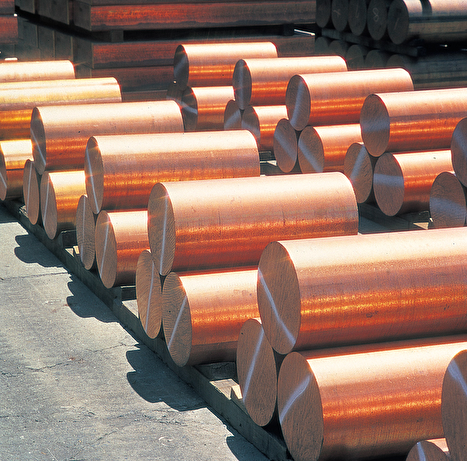Explore the Perks of Using Top Quality Copper Products for Home and Market
Explore the Perks of Using Top Quality Copper Products for Home and Market
Blog Article
Just How Copper Products Contribute to Sustainable Practices in Different Fields
In renewable power systems, for example, copper boosts the capability of solar and wind technologies, while its application in construction lessens waste through longevity. As sectors look for to take on more lasting techniques, the duty of copper can confirm pivotal in accomplishing environmental goals.
Copper in Renewable Resource
Copper plays a critical duty in the improvement of eco-friendly power modern technologies, acting as an essential conductor in different applications. Its exceptional electric conductivity and resistance to rust make it an excellent product for electric circuitry, which is vital in solar panels, wind turbines, and energy storage space systems. In solar photovoltaic or pv systems, copper is utilized in the affiliations and wiring, allowing reliable energy conversion from sunlight to electricity.
In wind energy, copper is essential to the generators and transformers that convert kinetic energy right into electric energy, ensuring ideal efficiency and integrity. Additionally, the need for electrical automobiles (EVs) is raising, with copper being an essential component in batteries, electric motors, and billing facilities. The change to EVs dramatically boosts the demand for copper, as these vehicles typically make use of 4 times much more copper than traditional internal burning engine lorries.
As the world seeks to minimize climate change and change to sustainable energy resources, copper's function comes to be progressively crucial. The material not just boosts the efficiency and longevity of renewable resource systems but additionally supports the broader goal of minimizing greenhouse gas exhausts and advertising a sustainable future.
Eco-Friendly Construction Materials
Over the last few years, there has actually been a noteworthy change towards the adoption of environment-friendly building and construction materials in response to expanding ecological issues. This adjustment is inspired by the demand for lasting alternatives that decrease environmental impacts while keeping structural integrity and visual charm.
Copper, recognized for its resilience and recyclability, has arised as an essential player in this field. It can be utilized in roof covering, plumbing, and electrical systems, contributing to power efficiency and lowering waste. Copper's longevity means fewer replacements gradually, further improving its sustainability profile.
In addition, materials such as bamboo, reclaimed timber, and recycled steel are acquiring popularity. These options not only use lowered environmental effect yet likewise advertise source preservation. As building codes progressively emphasize sustainability, home builders and designers are integrating these products into their jobs, fostering technology in style.
The raising fostering of environment-friendly building and construction products reflects a more comprehensive commitment to sustainability in the constructed atmosphere. By focusing on these materials, the building industry can substantially lower its carbon footprint, line up with governing standards, and sustain a much healthier ecological community for future generations. This pattern marks a crucial step in the direction of an extra sustainable future in building and construction.
Copper's Duty in Health care
Current studies have highlighted the significant role of copper in health care settings, particularly due to its antimicrobial residential or commercial properties. Copper surface areas have been revealed to lower the presence of pathogens, including germs and infections, by approximately 99.9% within a short period. This impressive efficacy makes copper a vital material for high-touch surface areas in hospitals, such as doorknobs, bed rails, and IV poles, therefore contributing to boosted infection control measures.
In addition to its straight antimicrobial impacts, copper also plays a role in the more comprehensive context of hospital sustainability (Copper Products). By integrating copper into medical tools and furnishings, health care centers can decrease the occurrence of healthcare-associated infections (HAIs), which not just enhances person results but likewise reduces the expenses related to prolonged health center stays and added treatments
Moreover, copper's resilience and recyclability align with sustainable practices, permitting for liable source administration. As health care systems significantly focus on both individual safety and security and ecological stewardship, the combination of copper items is ending up being much more widespread. This double advantage emphasizes copper's essential contribution to a much healthier, safer, and much more sustainable health care atmosphere.
Sustainability in Transportation

Moreover, copper's resilience and corrosion resistance contribute to the long life of transportation infrastructure (Copper Products). In rail systems, for instance, copper parts boost the integrity and efficiency of signaling and power systems, vital for minimizing hold-ups and energy intake. In addition, copper's role in renewable energy systems, such as solar and wind, supports lasting transport remedies by offering clean power for electric transit alternatives
Investments in copper innovation not only foster sustainability however likewise promote financial growth and job production in environment-friendly industries. As markets aim to meet rigorous ecological guidelines, the application of copper products in transport arises as a critical technique in accomplishing sustainability objectives and advertising a cleaner, much more effective future.
Copper and Round Economic Climate
As the globe significantly accepts sustainability, the function of copper in the circular economy ends up being ever a lot more substantial. Copper's innate properties-- such as its recyclability, resilience, and conductivity-- setting it as an essential product in a resource-efficient economy. The circular economy aims to lessen waste and optimize source use via recycling and reusing materials, and copper excels in this respect.
The steel can be recycled forever without loss of high quality, making it a perfect prospect for sustainable techniques throughout numerous markets, including construction, electronics, useful content and renewable resource. visite site By recouping and recycling copper from end-of-life products, industries can significantly reduce the demand for virgin products, consequently reducing environmental effects associated with mining and handling.
In addition, the combination of copper right into circular economic situation structures not just conserves resources but also fosters innovation. Organizations that prioritize copper recycling add to a much more lasting supply chain, boosting their competitiveness while aligning with regulatory demands and customer preferences for environmentally responsible items.
Verdict
Finally, copper products substantially contribute to lasting methods across multiple fields. Their essential role in improving eco-friendly power innovations, advertising environmentally friendly construction products, supporting infection control in healthcare, facilitating sustainable transport, and embodying the concepts of a round economic climate underscores the versatility and relevance of copper. By incorporating copper into numerous applications, markets can achieve higher effectiveness, decrease ecological effect, and straighten with worldwide sustainability goals, eventually fostering a much more sustainable future.

Copper's excellent conductivity makes it a favored material in electrical vehicle (EV) systems, improving energy efficiency and performance. In addition, copper's function in sustainable power systems, such as solar and Get More Info wind, sustains lasting transport solutions by giving tidy power for electrical transit alternatives.
Their necessary function in improving eco-friendly energy modern technologies, promoting eco-friendly building and construction materials, sustaining infection control in healthcare, facilitating lasting transportation, and personifying the concepts of a round economic situation underscores the versatility and importance of copper.
Report this page